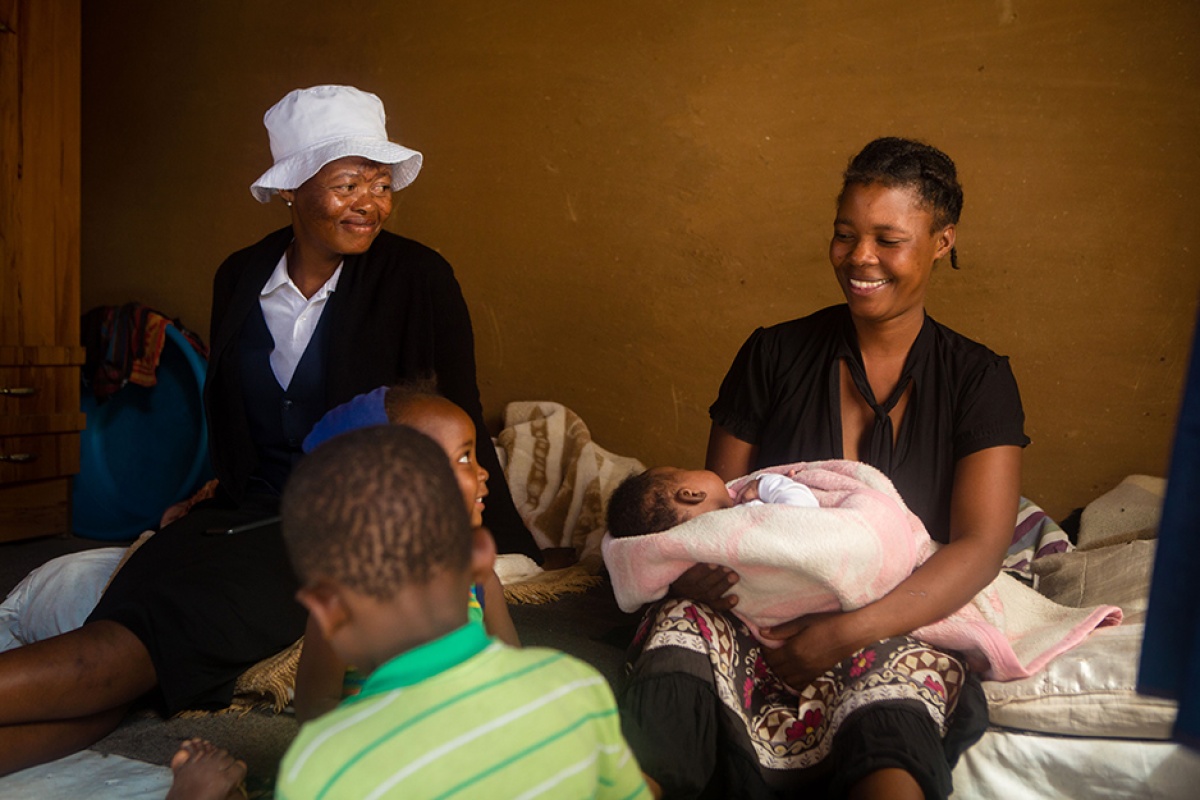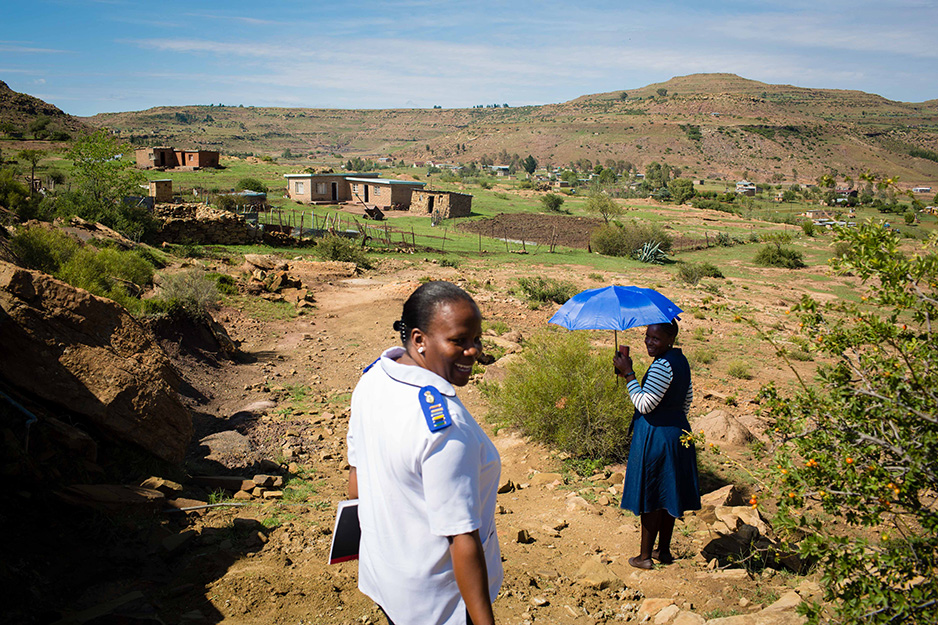Parents Managing HIV, Four Healthy Kids in Lesotho
Posted on Mar 9, 2018

(Photo by Cecille Joan Avila / Partners In Health)
On a sunny morning in February, near the end of a hot, dry summer in the southern Africa nation of Lesotho, Mafelleng September held her month-old infant on her lap while two young children played on the floor in front of her.
A fourth child—the oldest, at 9 years—was away at school. Her husband, Hlalele, also wasn’t home that morning, as he was out looking for labor work around their rural community of Motse Mocha. That meant September had her hands full as she nursed their infant, Katleho, kept an eye on 3-year-old Felleng and watched 5-year-old Teboho busily sort a deck of cards into piles. Soft music played over a radio, and a breeze wafted in through a window.
September is 35 years old and HIV-positive. She’s been on antiretroviral therapy (ART) since 2012. Her husband began ART last year. All four children, however, are HIV-negative. While Katleho has more tests ahead, to check his status through infancy, the results are incredibly heartening for a family in a remote corner of one of the most HIV-prone regions in the world.
They’ve had a lot of help. Village Health Worker (VHW) Makatieho Mpeli has been looking after the family since at least three years ago, when she accompanied September to the regional Holy Cross Health Centre for the delivery of Felleng. September again gave birth safely and successfully at Holy Cross in January, when Katleho was born.
Mpeli lives near Motse Mocha, which is in the mountainous district of Mohale’s Hoek. She works with 12 families in the area, accompanying them to health facilities, helping them access medicines, providing education and checking up on treatment and conditions. She said she visits about four families a day, but one of those families always is the Septembers. Mpeli visits their two-room home daily, to help with cooking, cleanup and care for the four active children.
The main aspects of the Septembers’ care—maternal and child health, and HIV treatment—are priorities for Lesotho’s national health reform, which began in 2014. Partners In Health (PIH), known locally as Bo-mphato Litsebeletsong Tsa Bophelo, is supporting the reform as the primary technical advisor to Lesotho’s Ministry of Health.
VHWs like Mpeli are on the front lines for the reform’s goals of reducing child mortality, improving maternal health, combating HIV and TB, and ultimately, achieving universal health coverage. As part of its role in the reform, PIH has installed VHW coordinators at 72 health centers across four of Lesotho’s 10 districts, to improve management, oversight and structure of the VHW system.
Those districts include Mohale’s Hoek, where hard-to-reach homes are a fact of life.
Motse Mocha lies in a valley dotted by small farms and homesteads, and surrounded by high ridges that can offer views into South Africa. Reaching the Septembers’ home requires bouncing along a rough dirt road and then clambering down a steep, rocky path, where a wrong turn can lead to ducking under the barbed-wire fencing of neighboring homesteads or stepping across boulders on the edge of small cliffs.

Dr. Mahlape Tiiti, the district’s health manager, said nearly 80 percent of Mohale’s Hoek’s 170,000 people live in rural areas—and most of those people, she added, live in “very remote places” without easy access to health services.
Tiiti said the lack of access to health services and health education, rooted in Mohale’s Hoek’s rugged topography, contributes heavily to the district’s HIV prevalence rate of 29 percent across all ages. That’s the highest such rate in Lesotho. Tiiti said people who live two hours or more from health services—common in Mohale’s Hoek—are less likely to be tested for HIV, or to consistently access treatment.
Those challenges are familiar across Lesotho, where the nationwide HIV prevalence rate of 25 percent among adults is the second-highest in the world, behind only nearby Swaziland.
More than halfway into Lesotho’s health reform, VHWs like Mpeli are helping turn that tide.
Mpeli visited the Septembers that February morning along with her VHW coordinator, Bonang Motlomelo, and district health staff. Mpeli and Motlomelo sat on a mattress on the floor next to Mafelleng September, while the children played. Talk soon moved to breastfeeding, immunizations and the process for Katleho’s upcoming six-week checkup at Holy Cross.
While the two younger children were born at the health center, the two older boys were born at Mohale’s Hoek District Hospital, before the reform began.
September said delivering little Katleho and Felleng, now 3, at the closer Holy Cross was much better than delivering at the hospital, where September had to pay for services and care felt less personal. Holy Cross provided baby clothes and a bukana—a small book in which a child’s immunizations, doctor visits and health data is recorded—along with basic care supplies, food, and more, all for free.
PIH’s role in the reform also has included funding cooks, food and materials such as bed linens in maternal waiting homes—where expecting mothers can stay for days or weeks before giving birth safely—in all 72 health centers across the reform’s four districts.
The free services can be invaluable. September said that five years ago at the hospital, when she delivered Teboho, the delivery cost 75 South African rand (about US$6) and a bukana cost 15 rand, among other fees. Hlalele provides for the family by working whatever maintenance and labor jobs he can find in the area, sporadically bringing home about 200 rand.
That income is stretched thin. Teboho and Felleng would be in preschool if the family could afford to send them, Mpeli said. Instead, Teboho will start primary school next year, when he’s 6.
Mafelleng September held Katleho close that morning, as she talked with health staff. The conversation eventually moved to general chitchat and laughter. Soon, it was time to go.
After many good-byes, the district health staff walked up the steep path and departed by truck, on their way to other homes and then back to Holy Cross. Mpeli also was off to other homes, except by foot, walking as she does every day. She waved as she steadily made her way down the dirt road, wearing a round-brimmed hat and carrying a long umbrella in case the sun became too hot, off to the next home, and the next family.

